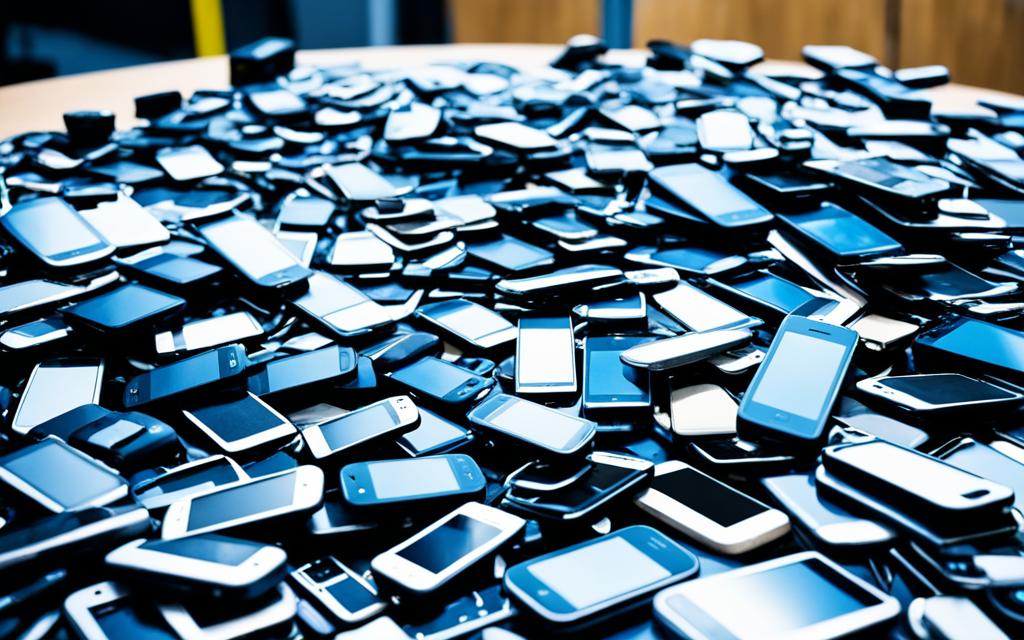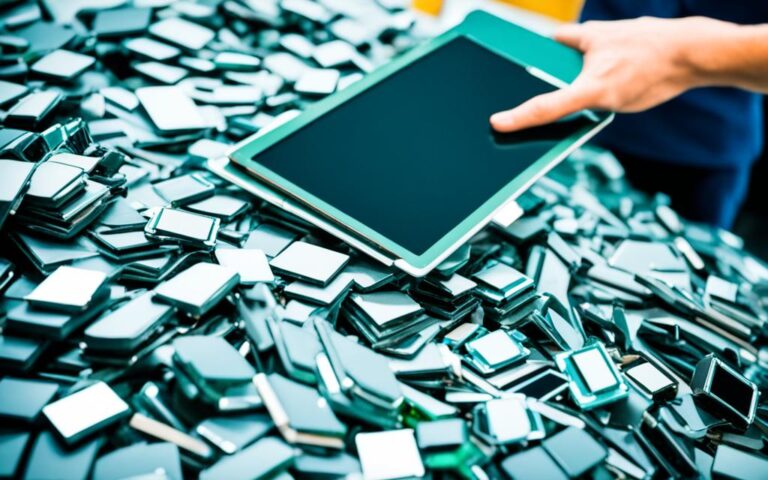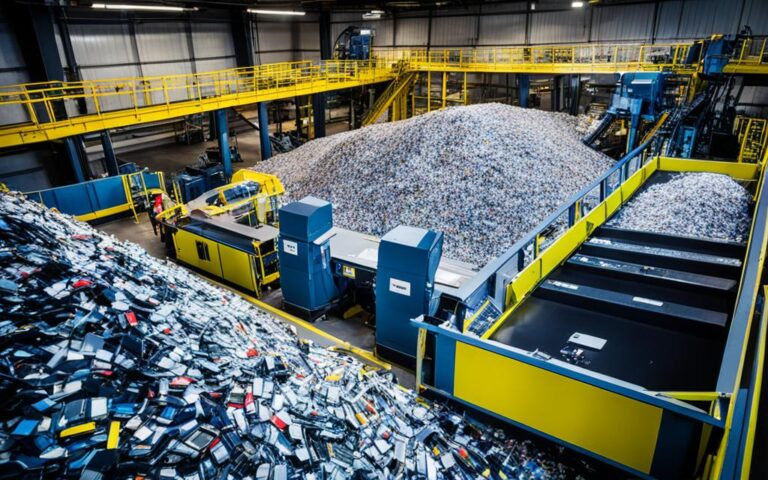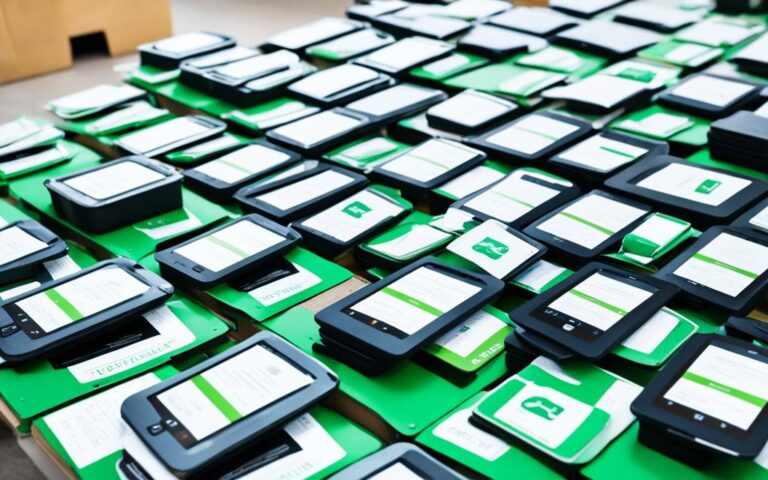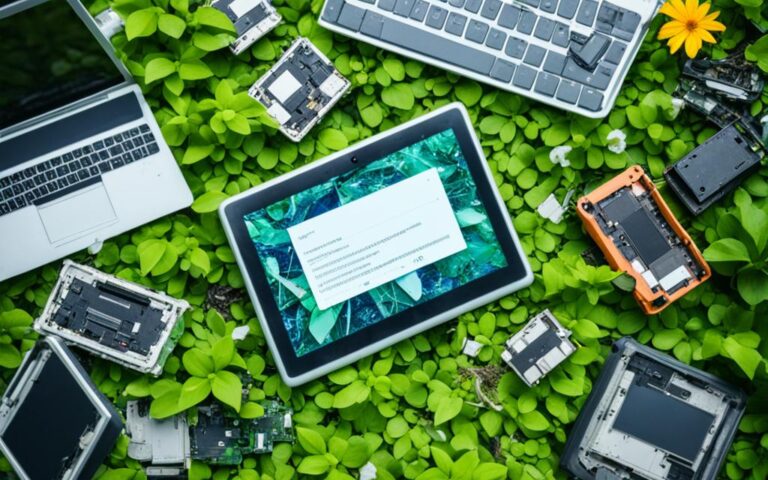Innovations in Mobile Phone Recycling Technologies
Mobile phone recycling is crucial for building a sustainable future. With the ever-increasing number of discarded phones, it is essential to find innovative recycling technologies that make the process easier, cheaper, and less harmful to the environment. By recycling our old mobile phones, we can not only reduce e-waste but also recover valuable metals and conserve natural resources.
Currently, only 3% of mobile phones are recycled, while 4% end up in landfills, leading to significant environmental implications. Each phone contains precious metals like silver and gold, which can be extracted through efficient recycling processes. The development of modular phones with replaceable components and advanced systems for metal recovery, such as the use of ionic liquids, are paving the way for a more sustainable approach to mobile phone waste management.
In this article, we will explore the challenges of mobile phone recycling, the innovations that are revolutionizing the industry, and the efficient and sustainable processes that are being developed. Together, we can contribute to a greener and more sustainable future by embracing mobile phone recycling and responsible e-waste management.
The Recycling Challenge
In the recycling process, only a small fraction of the 20 different materials in a phone are recuperated. This presents a significant recycling challenge, with environmental implications and the potential waste of valuable metals like silver, gold, and platinum group metals. The recovery rate is even lower in developing countries, where manual disassembly is common. Not only does this result in a loss of precious resources, but it also exposes workers to hazardous chemicals.
Between now and the end of 2020, it is estimated that 10 million tonnes of electronic products will be purchased in the UK alone. These devices contain a vast amount of valuable metals, which have a total market value of £1.5 billion. Failing to properly recycle these materials not only leads to significant economic loss but also has detrimental effects on the environment.
| Recycling Challenge | Environmental Implications | Valuable Metals |
|---|---|---|
| Only a small fraction of phone materials are recuperated in the recycling process. | Improper recycling leads to environmental degradation and resource depletion. | Valuable metals like silver, gold, and platinum group metals are wasted. |
| Recovery rates are even lower in developing countries. | Manual disassembly exposes workers to hazardous chemicals. | Failure to recycle wastes potentially lucrative resources. |
| An estimated 10 million tonnes of electronic products will be purchased in the UK, with valuable metals worth £1.5 billion. | Improper recycling contributes to pollution and greenhouse gas emissions. | Proper recycling can recover and reuse valuable metals for future manufacturing. |
Innovations in Mobile Phone Waste
The Clever project, a UK-based initiative, aims to develop ground-breaking science to prevent mobile phone waste. They have developed a prototype phone with a modular design that allows for easy replacement of components. This extends the useful life of the phone and reduces the amount of waste generated.
“Our goal is to create a circular economy for mobile phones, where every component can be reused or recycled.” – Clever project spokesperson
One of the key innovations of the Clever project is the use of plant cellulose for the phone’s skeleton. This biodegradable material ensures that once the phone reaches the end of its life, it can be easily disposed of without harming the environment.
Modular Design for Easy Replacement
The Clever project’s phone features a modular design, allowing users to replace specific components instead of discarding the entire device. For example, if the battery is no longer holding a charge, users can simply replace the battery module, eliminating the need to buy a new phone.
Furthermore, the Clever project is exploring the use of circuit boards that dissolve into sugars when exposed to specific conditions. This innovative approach makes it easier to separate valuable metals from the circuit boards, facilitating efficient and sustainable metal recovery.
Collaboration with Google
Google is also contributing to the development of closed-loop recycling with a modular phone prototype. The project aims to create a phone that is easy to upgrade and repair, reducing electronic waste.
The Clever project and Google’s collaborative efforts showcase the industry’s commitment to closed-loop recycling and a sustainable future for mobile phone waste.
“By designing phones that are easy to repair and upgrade, we can significantly reduce electronic waste and its environmental impact.” – Google spokesperson
Efficient and Sustainable Recycling Processes
As the issue of electronic waste (e-waste) continues to grow, several companies and research projects are dedicated to developing more efficient and sustainable recycling processes. These initiatives aim to address the environmental and resource implications of e-waste while maximizing the recovery of valuable metals.
One notable project is the AERTOs project, supported by the European Union. This project has successfully developed a process that eliminates the need for smelting and the use of hazardous chemicals. Instead, they employ a method that involves the separation of printed circuit boards, followed by crushing and sieving. An innovative flotation process is then utilized to separate plastics and metals, ensuring efficient metal recovery without compromising environmental safety.
Another remarkable process is the eVOLV process developed by Entegris. This method utilizes an acid-based solution to recover an impressive 98% of precious metals from electronic waste. By implementing this closed-loop process, valuable materials can be effectively extracted and recycled, reducing the need for resource-intensive mining operations while minimizing carbon emissions and energy consumption.
“Our goal is to revolutionize e-waste recycling by developing sustainable processes that not only recover valuable metals but also reduce the environmental impact of hazardous techniques like smelting. By embracing closed-loop recycling, we can transform the way we approach electronic waste management.” – Project Lead, AERTOs project
These innovative and sustainable recycling processes provide a more environmentally friendly alternative to traditional smelting methods. They not only minimize the harmful effects of hazardous chemicals but also significantly reduce carbon emissions and energy consumption. By showcasing the remarkable potential of closed-loop recycling, these initiatives contribute to a more sustainable and circular economy.
Conclusion
Smartphone recycling is crucial for creating a sustainable future and mitigating the environmental impact of e-waste. Through innovative technologies and designs, efforts are underway to make phone recycling more accessible, affordable, and safer. By reusing and recycling smartphones, we can recover valuable metals, conserve natural resources, and reduce the carbon emissions associated with manufacturing new devices.
To contribute to proper e-waste management, it is essential for individuals and organizations to recycle or repurpose their old devices. Initiatives like Sustainable World Recycling are leading the way in responsibly recycling and repurposing electronic devices, paving the path towards a better and more sustainable future.
By embracing smartphone recycling and advocating for effective e-waste management, we can each play a part in reducing the environmental impact of our technological consumption. Together, let’s strive for a future where sustainable practices are the norm, and our planet’s resources are preserved for generations to come.
FAQ
Why is mobile phone recycling important?
Mobile phone recycling is important because it promotes a sustainable future and reduces the environmental impact of electronic waste. By recycling smartphones, valuable metals can be recovered, natural resources can be conserved, and carbon emissions associated with manufacturing new devices can be reduced.
What are some innovative technologies being developed for phone recycling?
Innovative technologies being developed for phone recycling include modular phones with replaceable components, systems that recover metals using advanced processes like ionic liquids, and the use of plant cellulose for the phone’s skeleton. These technologies make phone recycling easier, cheaper, and less hazardous.
How are valuable metals recovered during the phone recycling process?
During the phone recycling process, valuable metals like silver and gold are recovered through various methods. Advanced processes like ionic liquids are used to separate and recover metals from electronic waste. However, it should be noted that only a small fraction of the 20 different materials in a phone are currently recuperated.
What are the environmental implications of not recycling mobile phones?
Not recycling mobile phones has major environmental implications. Only 3% of mobile phones are currently recycled, while 4% end up in landfills. Each phone contains valuable metals, and the lack of recycling leads to a waste of these resources. Additionally, disposing of mobile phones in landfills can contribute to pollution and the release of hazardous chemicals.

